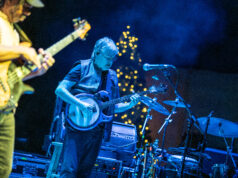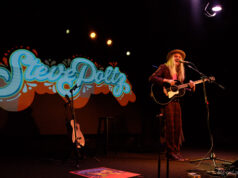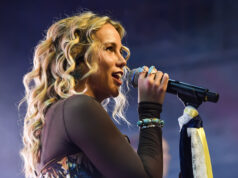Sister Sadie (Photo by Jon Roncolato)
At the end of a recent show at The Birchmere, everyone on stage — except for mandolin player Tristan Scroggins, who his bandmates call “Mr. Sadie” (playing on the band’s name, Sister Sadie) — was a woman. It was proclaimed to be “as many women as you’ve seen on stage at a bluegrass show.”
In a male-dominated genre, Sister Sadie and Della Mae have consistently proven they belong in the top ranks. Della Mae has received Grammy nominations, and fiddler Kimber Ludiker is a two-time national champion. For their part, the oft-shifting lineup of Sister Sadie has won the International Bluegrass Music Association’s award for best vocal harmony group three times. It was the first time for both bands at this venue, but founding member and fiddler for Sister Sadie, Deanie Richardson, has performed there with major country stars like Vince Gill and Patty Loveless.
Sister Sadie took the stage first at The Birchmere on Nov. 20, and their set was heavy on covers, which are a staple of bluegrass. As a genre, it’s known more for the virtuosity of its instrumentalists more than its songwriting, though there are some great bluegrass songs. They started with Merle Haggard’s “I’m A Lonesome Fugitive,” and other covers included Eddie Arnold’s “Make The World Go Away” and Woody Guthrie’s “900 Miles.” The newest member of the group, Danni Flowers, sang lead on Gram Parson’s “Hickory Wind.” They also played a tune written by fellow female bluegrass standout Becky Buller.
The set also had a few original numbers. Banjo player Gina Britt, who Richardson referred to, along with herself as “the weathered, 50-something-year-old bookends” of the band (I can only hope to weather the years so well!) wrote “Raleigh’s Ride.” Richardson penned “If We Ain’t A-Drinkin’, We’re A-Fightin’.” Sister Sadie’s set ended with their original tune, “Blood Red and Goin’ Down.”
Watch Sister Sadie perform “Blood Red and Goin’ Down” live at Music City Roots on YouTube:
When Della Mae took the stage after a short break, vocalist and washboard player Celia Woodsmith told the audience that, because of how they’re booked, they rarely get to see bands like Sister Sadie on the festival circuit. Unspoken here was the implication that these festivals have a limited number of female acts, which are often spread out across a festival so that there’s at least one playing every day. (It would be embarassing to have no women on stage for a whole day, but just one band is so much better!) Country music, of which bluegrass is a subgenre, has a gender problem; as Marissa Moss’s excellent Her Country details, these issues affect festival booking, radio play, and more. That’s a shame, because much of the best work in contemporary country music is made by women like Miranda Lambert (and her band, The Pistol Annies) and Kacey Musgraves.
Feminist and social justice themes figure prominently in Della Mae’s original songs. They opened with “Boston Town,” a song about working women’s struggle for labor rights. Guitarist Avril Smith lives in this area and has worked for the Service Employees International Union for years. Introducing “The Way It Was Before,” a song about gun violence, Woodsmith said, “I don’t normally wish that a song that I wrote would go out of existence.” She continued, “This isn’t political; this is about people losing their lives.” She wrote “Headlight” written after seeing Christine Blase Ford testify that she’d been assaulted by Supreme Court nominee Brett Kavanaugh.
Watch Della Mae perform “Headlight” live for Sugarshack Sessions on YouTube:
There was a lot of cohesion to this set, with Neil Young’s “Ohio” — written about the Kent State Massacre of four students by the Ohio National Guard — fitting in nicely. Other covers — Gillian Welch’s “Dry Town,” Hank Williams’s “A House of Gold,” and Bob Wills’s “Tulsa Time” — were nice touches, too. Other original songs in the set included “Heart of My Home,” “The Odds of Getting Even,” “Won’t Be Long,” and “No-See-Um-Stomp,” a song about creepy-crawly bugs.
At the end of the evening, in addition to the two bands, there were a few guests on stage: author Murphy Hicks Henry, who wrote Pretty Good For A Girl: Women In Bluegrass, and local duo Marcy Marxer and Cathy Fink. There was a lot of joy and a lot of love on that stage, in addition to a ton of world-class talent.






